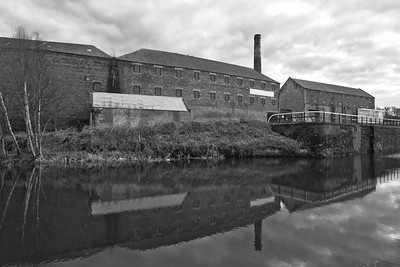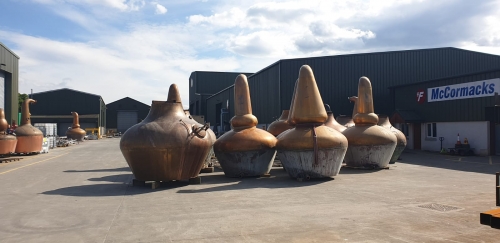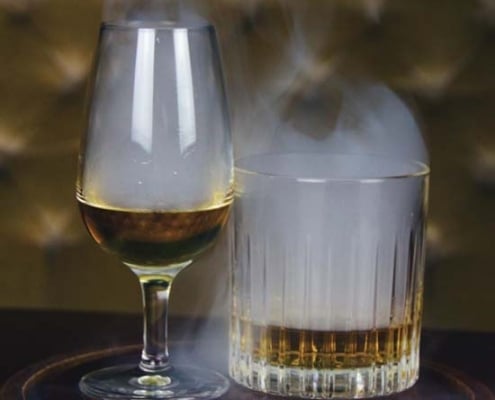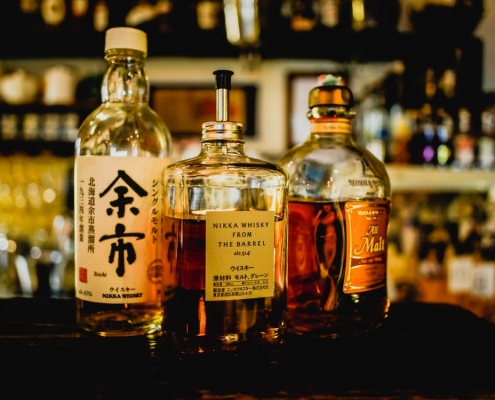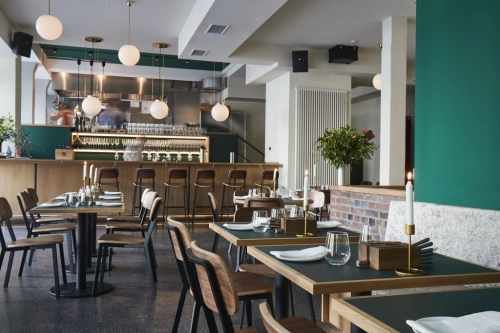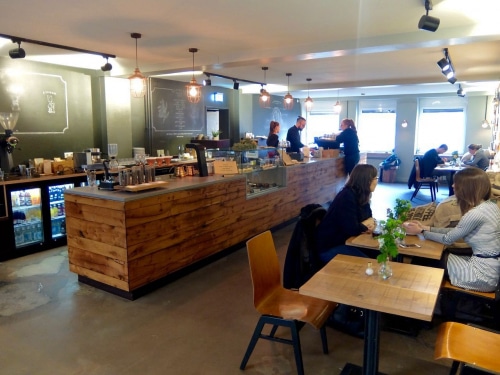Closed Scotch Whisky distilleries
Those who delve a little deeper into the World of Scotch Whisky sooner or later you will stumble across Lost Distilleries. In other words, whisky distilleries that are no longer in production or closed Scotch whisky distilleries.
These are distilleries that are currently no longer producing whisky. Some of them have even been cancelled and will never resume work in their usual form. Many of these whisky distilleries in Scotland are almost forgotten. A few enjoy a highly desirable image. Often this is due to scarce availability, good marketing or a combination of both. A handful of these disused distilleries are featured below.
Banff Distillery
The Banff Distillery in the Scottish Highlands is one of the distilleries in Scotland that has been hit extremely hard by fate over the course of its existence. The production site was located in the small town of Inverboyndie not far from the Deveron estuary into the North Sea. The first major disaster occurred in 1877. A fire destroyed the main building of the distillery. The next disaster followed in 1941. A German bombing raid destroyed large parts of the plant. An explosion caused by soldering work on the boilers devastated the plant once again in 1959. The distillery was closed for some time after each of these disasters. It finally ceased operations for the last time in 1983. And even when it was closed, the distillery was not spared accidents. In 1991, the distillery, which had already been partially demolished, burned down again.
Due to all the destruction, only a few whiskies from this house are still available. The last owner, Scottish Malt Distillers (predecessor of Diageo), hardly released any of its own bottlings from the distillery, which was founded in 1824. Today, a few bottlings are still available from Rare Malts Selection, Connoisseurs Choice (Gordon & MacPhail) and Duncan Taylor. The house style is described by Michael Jackson as creamy, fragrant and fruity (lemongrass, lime, apricot).
Imperial Distillery
The Imperial Distillery is located in the heart of Speyside, right on the River Spey. It was closed for most of its 100-year history. From its opening in 1897 to its final closure in 1998, it was only in operation for a total of 45 years. The buildings were finally demolished in 2005 to make way for the new Dalmunach Distillery. Both whiskies are or were almost exclusively intended for blended whiskies. In the early 1990s, Imperial launched a standard 15-year-old bottling. This is now difficult to obtain. There are still some independent bottlings from Signatory, The Single Malts of Scotland or Morrison Scotch Whisky Company on the market.
The style of Imperial is described as fruity and sweet. Lots of citrus flavour meets wood and a little smoke. One of the reasons that certainly led to the decline of the production facility was its huge stills (wash stills: 18,500 litres - spirit stills: 20,500 litres). Allegedly, the plant could only distil large quantities or nothing at all. In the economically difficult 1980s and 1990s, this was certainly not a favourable argument for continuing the distillery.
Lochindaal Distilleey
Even though the Lochindaal distillery was shut down almost 100 years ago, it still meets the Islay Whisky fan is still common. However, the name Lochindaal is less well-known than its synonym Port Charlotte. This is partly thanks to the Bruichladdich distillery on Islay. Not only was one of its bottlings named after the disused distillery. There have also been plans for years to reopen the forgotten Scotch whisky distillery. It remains to be seen when exactly the new distillery will start work. In the town of Port Charlotte on the island of Islay, there was another forgotten distillery until 1852, to which Bruichladdich also pays tribute with one of its bottlings: Octomore.
Lochindaal began operating in 1829 and was closed in 1929. The annual production was around 500,000 litres of New Make, which was a considerable amount for the time. The distillery had three stills. It is interesting to note that at the time of the Port Charlotte distillery, triple distillation was still common in Scotland.
Rosebank Distillery
The official year of foundation for the Rosebank distillery in Falkirk is 1840, but whisky was already being distilled on the same site, conveniently located on the banks of the Forth-Clyde Canal, at the end of the 18th century. Rosebank distilled using the three-stage distillation process typical of the Lowlands. At the end of the 20th century, the distillery closed again in 1993. The then owner United Distillers closed the Rosebank distillery. The successor company, Diageo, released a few more highly regarded bottlings as part of the Flora & Fauna series. Most recently a 21-year-old at cask strength.
In the meantime, things are happening again at Rosebank. Ian Macleod bought the remains of the distillery and the rights to the brand in 2017 and is planning to reopen the distillery in 2022. Ian Mcleod already awakened the Tamdhu malt distillery from its slumber in 2011 and has been successful on the market with the Glengoyne single malts. Accordingly, there is great anticipation for the reopening of the Rosebank Distillery. A 30-year-old Rosebank was bottled from the old stocks in 2020. The whiskies are characterised by flavours such as chamomile, clover, spices and apple.
Port Ellen Distillery
The Port Ellen Whisky Distillery on the island of Islay is certainly one of the best-known closed malt distilleries in Scotland. The parent company Diageo regularly ensures this with breathtaking bottlings as part of the special release series. Even the few independently bottled bottles from the iconic distillery are quickly sold out. It always remains a mystery when the last bottling of the remaining stock will leave the warehouses. The prices for a bottle of Port Ellen are correspondingly high, and it is not uncommon for it to disappear into the display case as an investment. The distillery was founded in 1825 and ceased operations in 1983. The former distillery site is now home to a large malting plant, which supplies almost all Islay distilleries with barley malt.
A few years ago, Diageo announced plans to reopen the Port Ellen distillery. However, due to the coronavirus pandemic, the plans could not be realised and the date of reopening is still in the stars.
